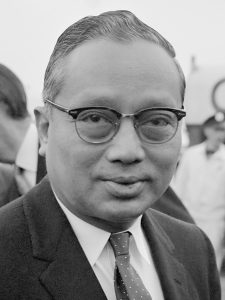As UN secretaries-general, U Thant of Burma and Perez de Cuellar of Peru had much in common, writes Myint Zan in a comparative tribute and commemoration.
With the recent appointment of former Portuguese prime minister Antonio Guterres as the ninth secretary-general of the United Nations there are now three former UN secretaries-general living—Ban Ki-moon (South Korea), Kofi Annan (Ghana) and Javier Perez de Cuellar.
The oldest of the three, Perez de Cuellar, will be 97 on 19 January. The occasion of his birthday is an opportunity to reflect on his contribution as the UN’s fifth secretary-general and compare him with the third person to fill the post: U Thant, who was born 11 years before Perez de Cuellar, on 22 January 1909, and died in the United States on 25 November 1974.
As secretaries-general, Perez de Cuellar and U Thant had much in common. Both were ‘accidental’ appointments who had not sought the post, and resisted persistent requests to stay on for a third term.

Perez de Cuellar was present at the creation of the UN in 1946. As a 26-year-old officer at the Peruvian Foreign Office, he attended the first General Assembly meeting in London. Nearly 36 years later he was elected as a compromise candidate to become the UN’s fifth secretary-general after the disgraced Austrian, Kurt Waldheim, who had lied about his Nazi past, failed to secure a third term as secretary-general.
At the time of Perez de Cuellar’s election in December 1981, Time magazine stated that the new secretary-general compared favourably with the ‘self-effacing’ U Thant.
Perez de Cuellar served with distinction for 10 years, from 1 January 1982 until 31 December 1991. After serving two terms, he was asked to stay on for a third term, including by US president George HW Bush, but declined.
U Thant was also an ‘accidental’ secretary-general. When the UN’s second secretary-general, Dag Hammarskjold, died in a plane crash in September 1961 the Soviet Union demanded that the office be replaced by a troika of secretaries-general—one from the West, another from the East, and a third from the ‘Third World’. As a compromise, the General Assembly, in a secret ballot, elected U Thant with 101 votes for, none against and no abstentions.
Since Perez de Cuellar all secretaries-general—with the exception of Kofi Anan—have openly sought and campaigned for the coveted post

Accidental secretary-general U Thant might have been, but near the end of his second term, in 1971, all the veto-wielding permanent members of the Security Council requested him to stay on for a third term that he categorically and repeatedly refused to serve. This was in stark contrast to Waldheim who, from near the end of his second term, campaigned unashamedly for a third term, but was thwarted in the Security Council by China, which exercised its veto—16 times—to reject his candidacy.
Since Perez de Cuellar all secretaries-general—with the exception of Kofi Anan, the Ghanaian diplomat who served as the seventh secretary-general from January 1997 to December 2006—have openly sought and campaigned for the coveted post, which the UN’s first secretary-general, the Norwegian Trygve Lie, called ‘the most impossible job on this Earth’.
Paths diverge
After leaving the office, U Thant’s and Perez de Cuellar’s paths diverged. Within three years of retiring, U Thant died of cancer in New York. An obituary in Time said that, in his final years, U Thant lived quietly in a suburban villa in New York writing his memoirs about events that had ‘thrust him unexpectedly into the vortex of world affairs’.
Like his predecessor Kurt Waldheim, after serving two terms as UN secretary-general, Perez de Cuellar sought high office in his home country. Waldheim was elected as Austria’s president and held office from 1986 to 1992. Perez de Cuellar, however, made an unsuccessful bid for the presidency of Peru. (The recently retired secretary-general, Ban Ki-moon, has indicated he might be a candidate for president of South Korea.)
Shortly before his death, in a radio interview with Voice of America (Burmese language service), U Thant indicated that he planned to return to Burma in 1975. Instead his funeral in Rangoon in December 1974 led to the ‘U Thant crisis’, a student-led but shortlived uprising against Ne Win’s ‘military and one-Party regime.
After years of neglect and denigration by successive Burmese regimes, U Thant was ‘rehabilitated’ under the administration of U Thein Sein. A significant majority of the Burmese people who know about the former secretary-general still admire and respect him.
Critics
U Thant and Perez de Cuellar were not without their critics. Some of the criticisms were severe and mocking—but uncalled for and unjustified. One journalist, Rosemary Righter, wrote that U Thant was ‘invisible’ and that Perez de Cuellar would ‘not make waves if he jumped from a boat’. Was Righter aware that when U Thant’s son died in in Rangoon in May 1962, the secretary-general was so dedicated to his job and ‘encumbered with the burdens of office’ that he was unable to travel to Burma to attend the funeral?
Perez de Cuellar’s grace and magnanimity came to the fore in 1995 during the UN’s 50th anniversary celebrations. The then secretary-general, Boutros-Ghali, decided not to invite Waldheim and Perez de Cuellar, as former secretaries-general, to New York because Waldheim, as a former Nazi, was barred from entering the United States. Waldheim phoned Perez de Cuellar to verify that he, Perez de Cuellar, was also not invited. Perez de Cuellar wrote that he understood Boutros-Ghali’s decision.
Since 2001 the United Nations University in Tokyo has held the annual U Thant Distinguished Lecture. The first lecture was given by a very different personality from the former self-effacing secretary-general—the sometimes irascible and arrogant former Malaysian prime minister, Dr Mahathir Mohamad.
Perhaps a more appropriate choice would have been U Thant’s distinguished successor, Javier Perez de Cuellar.
Featured image
UN General Assembly hall in New York. Photo: Patrick Gruban, Flickr
